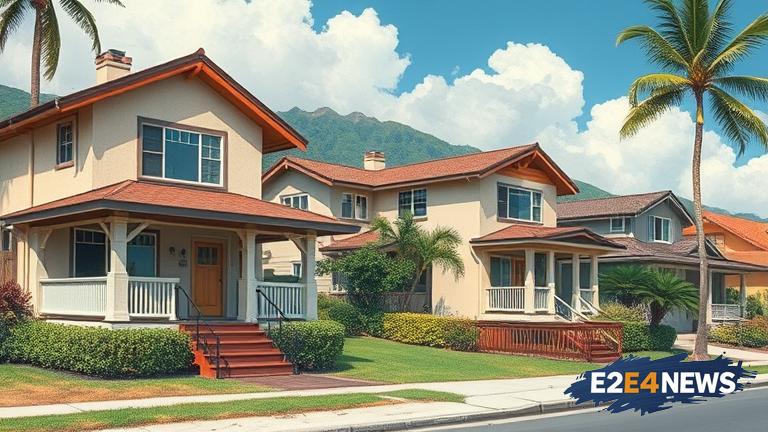The recent surge in property taxes on the island of Oahu has left many residents reeling. Homeowners are reporting significant increases in their tax bills, with some seeing jumps of 20-30% or more. The sudden and substantial rise in property taxes has caught many off guard, leaving them scrambling to make ends meet. The issue is particularly concerning for long-time residents who have seen their property values increase exponentially over the years. As the cost of living in Hawaii continues to rise, many are worried that the increased property taxes will be the final straw, forcing them to reconsider their ability to afford their homes. The problem is not limited to residential properties, as commercial property owners are also feeling the pinch. Business owners are concerned that the increased taxes will be passed on to consumers, further exacerbating the already high cost of living in Hawaii. The cause of the sudden increase in property taxes is attributed to a combination of factors, including rising property values and changes in the tax assessment process. The City and County of Honolulu has implemented a new tax assessment system, which has resulted in higher valuations for many properties. While the city claims that the new system is more accurate and fair, many residents are disputing the increased valuations, citing errors and inconsistencies in the assessment process. The impact of the increased property taxes is being felt across the island, with many residents expressing concern about the potential consequences. Some are worried that the increased taxes will lead to a surge in foreclosures, as homeowners struggle to keep up with their mortgage payments. Others are concerned that the increased costs will be passed on to renters, further reducing the already limited availability of affordable housing in Hawaii. The issue has sparked a heated debate about the fairness and equity of the property tax system, with many calling for reforms to address the concerns of homeowners and businesses. In response to the outcry, city officials have announced plans to review the tax assessment process and consider adjustments to mitigate the impact of the increased taxes. However, for many residents, the damage has already been done, and they are left to wonder how they will afford their homes in the face of skyrocketing property taxes. As the situation continues to unfold, one thing is clear: the issue of property taxes is a complex and contentious one, with far-reaching implications for the people and businesses of Oahu. The city must find a balance between generating revenue and ensuring that the tax burden is fair and equitable for all. Ultimately, the goal should be to create a system that supports the long-term sustainability of the island’s economy and community. With the future of Oahu’s housing market hanging in the balance, it is imperative that city officials take a comprehensive and nuanced approach to addressing the concerns of homeowners and businesses. By working together, it is possible to find solutions that benefit everyone involved and ensure that the island remains a vibrant and thriving community for generations to come. The increased property taxes have also raised concerns about the potential impact on the local economy, as businesses and residents alike struggle to absorb the added costs. As the cost of living in Hawaii continues to rise, many are worried that the increased property taxes will be the final straw, forcing them to reconsider their ability to afford their homes and businesses. The situation is a stark reminder of the need for careful planning and management of the island’s resources, as well as a commitment to finding solutions that benefit the community as a whole. In the end, the key to resolving the issue of skyrocketing property taxes will be finding a balance between generating revenue and ensuring that the tax burden is fair and equitable for all. By working together and taking a comprehensive approach, it is possible to create a system that supports the long-term sustainability of the island’s economy and community.





